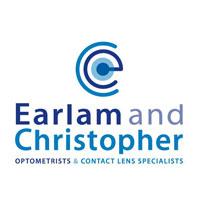FAQ's at Earlam and Christopher that we hope may help you…
Most people need an eye examination every two years. Certain groups of people can require more frequent appointments than this and the Optometrist will advise them accordingly.
If you are a private patient, this can be as often as you like. If you are an NHS patient, then it is as often as your Optometrist recommends. If you are an NHS patient and you want to have your sight tested again before your next NHS appointment is due (for example if you lost your glasses and wanted another test before replacing them) you would have to pay a private examination fee.
If you feel you are having problems with your eyes, we can advise you on whether you are entitled to an early NHS sight test or whether you will have to pay. In some cases it may be more appropriate for you to see your GP or an ophthalmologist rather than have an NHS sight test. The NHS sight test is for the provision of spectacles, not for emergency eye problems. If you think that your sight has changed before your next test is due, please just ask one of our reception team for advice.
You are entitled to an eye examination paid for by the NHS if:
- you are under 16 years of age
- you are under 19 years of age and in full time education
- you or your partner are getting income support
- you or your partner are getting working tax credit
- you are over 60 years of age
- you suffer from glaucoma
- you are diabetic
- you are over 40 years of age and have a family history of glaucoma
- you require certain types of complex (very strong) lenses
- you are registered as blind or partially sighted
- you have an NHS exemption form (HC2)
If you fall into any of the first four categories above or you require “complex” lenses you will get help towards the cost of glasses. The amount will vary dependent on your prescription and NHS entitlement (as designated by NHS rules).
The aging process cannot be halted! Sometimes the prescription will not change for many years, at other times they will seem to change quite quickly. In particular, children’s eyes can change very rapidly especially if they are shortsighted (myopic).
No. When you wear the proper glasses, you realize how much more clearly and comfortably you can see. What you may have considered normal and acceptable before is now inferior by comparison.
It’s a common misconception that when you start wearing reading glasses they make your eyes deteriorate – unfortunately once your reading vision begins to deteriorate (usually during your 40’s or 50’s) it will continue to deteriorate due to natural changes in the eye, regardless of how much or little you wear your glasses. A bit like getting grey hair or wrinkles – it is an aging process caused by the lens inside your eye growing larger and becoming less flexible. When you are given a prescription for glasses your Optometrist will advise you when to wear them. It is usually not possible to wear glasses too much – but you should not use glasses prescribed for reading for distance or vice versa unless the optician has told you to.
This should always be before they start school and ideally even younger. Good vision is vital for their early years’ education and often even though your child may appear to be seeing well, sometimes, a problem with one eye only or a muscle problem can cause problems with learning but won’t be noticeable at other times.
Small babies with suspected vision problems will usually be referred to the hospital but toddlers can have their eyes tested at the opticians.
They include rubbing eyes, squinting, turning or tilting head, losing their place or using a finger to follow along when reading, moving head or mouthing words while reading, headaches, red eyes, wandering eyes, complaints of blurred vision. However many disorders have no symptoms.
The Optometrist will use symbols and matching games instead of identifying letters. Letter matching can be practiced at home beforehand, and even children under 4 regularly surprise their parents in the consulting room by accurately showing us which letter is ‘the same’. Much of the testing that is done by the Optometrist requires little input from the child. The child’s eye exam is focused on assessment of the strength of the eyes, eye muscle status, and eye health to ensure proper vision development. Critical information can be obtained about your child’s eyes without them needing to say a word!
Nearly all people with astigmatism (irregular or rugby ball shaped eyes) can now be fitted with contact lenses. Soft and rigid gas permeable lenses can be used, and depending on the prescription even daily disposable soft lenses are available.
No, unless specifically told that you can by your Optometrist or Contact Lens Optician. Sleeping in your lenses can be hazardous as it can lead to infection or damage to the cornea (front window of the eye).
Your Optometrist or Contact Lens Optician will have recommended a solution for you based on many different factors. Your lenses and solutions should be seen as working as a team, and changing the solution can cause discomfort, allergies or other problems. Supermarkets often vary the contents of the bottle without changing the packaging so unless you note the ingredients down you can’t tell what you are buying. If you do change your cleaning system for any reason, always inform your practitioner.
They don’t have to be! New technology used in modern lens materials mean that lenses can be made much thinner and lighter nowadays, often over 40% thinner and lighter than standard lenses. Frames can also be lightweight, yet strong at the same time, using materials such as titanium and stainless steel for example. Our Dispensing Opticians can advise you on these latest technologies available, to maximise your visual comfort.
If you have glass or plastic lenses, then the best way to clean them is to gently wash them with lukewarm water (this will also wash any dirt from the frames too), then dry the glasses with a soft cloth but avoid anything that is paper based eg tissues, kitchen roll etc. It is essential that you always have a soft cloth, preferably microfiber, to wipe the lenses with at regular intervals too. If you have lenses with special coatings, they can be cleaned in the same way, but the use of a special cleaning solution specifically for coated lenses can be beneficial. If you have a mark or smears on the glasses which you are struggling to remove, bring the glasses in to us because we have special cleaning solutions which we could try.
Laser eye surgery can be undertaken to correct many cases of myopia (short sight) and astigmatism safely and predictably. Laser correction of hyperopia (long sight) is also possible. Presbyopia, which causes the need to wear reading glasses or bifocals, cannot currently be corrected by laser surgery though recent small experimental studies suggest that this may be possible over the next few years, either by laser or by implants into the cornea. As a result, most people over 45 will require reading glasses following surgery. Amblyopia (lazy eye) or other existing conditions that have caused damage to the eye or loss of vision cannot be repaired by laser surgery. Some people (usually if over 50) may be recommended an alternative treatment called ‘clear lens exchange’ which can give a better result. Your Optometrist will be happy to discuss refractive surgery with you.
You get a cataract when the clear lens inside your eye becomes misty or cloudy. Cataracts are most commonly an age-related condition, but many factors can contribute to an earlier onset. Ultraviolet light exposure has a cumulative effect, as does smoking and poor diet. If you have been told that you have the beginnings of a cataract, studies have shown that taking a simple vitamin supplement containing vitamin A, C and E can slow down progression of cataract, and also having a good balanced diet.
Glaucoma is a group of eye diseases in which the optic nerve, which connects the eye to the brain, is damaged by the pressure of fluid inside your eye. This may affect one or both of your eyes, and, if detected early, can be treated with eye drops to hopefully stop it getting any worse. Often, you can’t feel the pressure, and the damage happens slowly, so you might not know you have glaucoma until a lot of damage has been done. The damage can’t be put right, so it is very important to have your eyes tested regularly, at the intervals suggested by your optometrist. If you have a close relative with glaucoma and are over 40, your eye examination will be funded by the NHS.
Blepharitis is an inflammation of your eyelids. It usually affects both eyes and can make eyelids and eyelashes feel irritated or itchy. When diagnosed, you can normally treat it by taking care with your lid hygiene.
The macula is an area at the back of your eye that you use for seeing fine detail such as reading a book, recognizing faces or watching television. Macular degeneration happens when the macula becomes damaged, which makes it much harder to see fine detail. It is the leading cause of blindness in the UK, however, most people with MD still have their peripheral (side) vision and so can see well enough to get around. A diet rich in oily fish and coloured fruit and vegetables may reduce the risks of developing macular degeneration.
Vision is most commonly quoted as the most important of your senses, so why would you want to accept second best? At Earlam & Christopher we pride ourselves on a level of service that is second to none, from a comprehensive eye examination with your Optometrist, to a detailed glasses consultation with a qualified Dispensing Optician. Our Optometrists, Dispensing Opticians and Receptionists all regularly participate in continued education and/or training, to ensure that every patient receives an informative, personal and professional journey from the moment you make your appointment, during your examination right through to your dispensing.
We have a huge choice of frames with up to 1000 different styles in our Taunton branch and our independent status means we have frames and lenses available from many different manufacturers all over the world. Our dispensing team are trained to help you make the right choice and will spend all the time you need to help you get the look you want and with the vision you need. We can even take several pictures of you using our special app tool, which will let you see exactly what you look like in the selection of frames you choose before you make the final decision. This allows those with strong prescriptions to see their frames clearly before a decision is made. All our glasses have a satisfaction guarantee, and some are covered by a two year guarantee against manufacturing defects.
One of the things that differentiates us from many opticians is our long standing staff, meaning you can get the continuity of care from being regularly seen by the same Optometrist or Dispensing Optician which builds up a rapport and real understanding of your visual needs.

